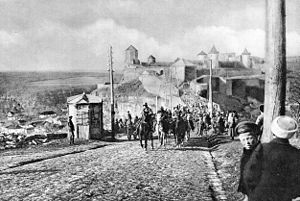Operation Faustschlag
| Operation Faustschlag | |||||||
|---|---|---|---|---|---|---|---|
| Part of the Eastern Front of World War I | |||||||
 Austro-Hungarian troops enter Kamianets-Podilskyi, Western Ukraine with the city's iconic castle in the background |
|||||||
|
|||||||
| Belligerents | |||||||
|
|
|||||||
| Commanders and leaders | |||||||
|
|
|
||||||
| Strength | |||||||
| 53 divisions | |||||||
The Operation Faustschlag (Fist punch), also known as the Eleven Days War, was a Central Powers offensive in World War I. It was the last major action on the Eastern Front.
Russian forces were unable to put up any serious resistance due to the turmoil of the Russian Revolution and subsequent Russian Civil War. The armies of the Central Powers therefore captured huge territories in the Baltics, Belarus, and Ukraine, forcing the Bolshevik government of Russia to sign the Treaty of Brest-Litovsk.
Bolsheviks took power in Russia during the October Revolution and announced that Russia would be withdrawing from war. Talks with the Central Powers started in Brest-Litovsk on 3 December 1917 and on the 17th a cease-fire went into effect. Peace talks soon followed, starting on 22 December.
As negotiations began, the Central Powers presented demands for the territory that they had occupied during the 1914-1916 period, including Poland, Lithuania and western Latvia. The Bolsheviks decided not to accept these terms and instead withdrew from the negotiations, eventually resulting in the breakdown of the ceasefire.Leon Trotsky, head of the Russian delegation, hoped to delay talks until a revolution occurred, which would force Germany out of the war.
Trotsky was the leading advocate of the "neither war nor peace" policy and on 28 January 1918 announced that Soviet Russia considered the war over. This was unacceptable to the Germans who were already transporting troops to the Western Front. The German Chief of Staff, general Max Hoffmann, responded by signing the peace treaty with Ukrainian People's Republic on 9 February and announced an end to the cease-fire with Russia in two-days time on 17 February, leading to the resumption of hostilities.
...
Wikipedia
